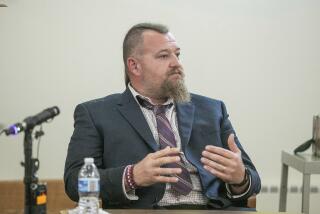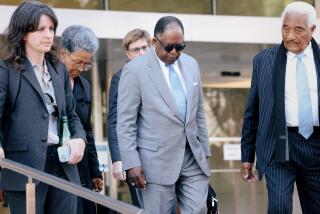THE NORTH VERDICT : Jury Marshaled to Verdict by ‘Soul-Stirring Prayer’
- Share via
WASHINGTON — The jury that convicted Oliver L. North of three felony counts did not come to agreement on those charges until Thursday morning, when a “soul-stirring prayer” brought the panel together, the only juror to provide an account of the deliberations said.
Unemployed security guard Earl F. Williams said previous discussions during the 12 days of deliberations had sometimes been riven by “bickering and arguing.” By Thursday morning, the jury had decided to acquit North on nine charges, believing that he had been “pushed a little too far out there by himself” by his superiors in the Iran-Contra affair, Williams said in an interview broadcast on ABC’s “Nightline” program.
Acquittal Favored
Some of the nine women on the 12-person panel favored acquittal on the remaining three charges, Williams indicated. But after the prayer by juror Caswell Hartridge, the holdouts said: “You know, I think I was wrong. You know, I could go along with the program a little bit better,” Williams said. “And that’s how we came to get together on the last three counts.”
The juror acknowledged that he and his colleagues had at times found difficulty in following the evidence in the complicated trial, and complained that documents presented seemed to contradict one another.
Partly as a result, he said, it was “touch and go in different spots” as to whether North should be convicted.
In a separate interview with reporters in front of his Washington home, Williams said the jury had spent much of its time discussing the allegations that North had illegally shredded sensitive documents describing his role in the Iran-Contra operation.
Saw North as Hero
Although Williams indicated that he had sided with those who urged that North be found guilty on at least some charges, he said he still regarded the former Marine as a hero.
“He was guilty but I don’t think he should go to jail for it,” Williams said.
After the two-month trial and 64 hours of intensive deliberations, most of the 12 jurors seemed to want nothing so much as to put their extraordinary experience behind them.
“Right now, all I want to do is catch the next plane to Jamaica,” a weary Jean I. Johnson told reporters after federal marshals escorted her from the camera-encircled federal courthouse to her modest Washington home.
Johnson, a 53-year-old cashier who had won a place on the jury after she told the court, “I’m not into politics,” refused to disclose what had transpired during days of debate in an isolation so complete that there were no windows in the jury room and those in the courtroom had been covered with paper. Likewise, Ernest Nelson, a 30-year-old telecommunications technician, told reporters gathered outside his home: “I’m tired, and I’m trying to relax. I just want to spend time with my family, because I missed them all very, very much.”
More to Read
Sign up for Essential California
The most important California stories and recommendations in your inbox every morning.
You may occasionally receive promotional content from the Los Angeles Times.













